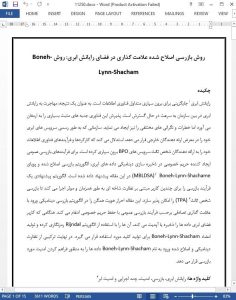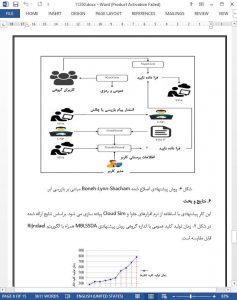Abstract
Cloud Computing is an alternative to conventional IT Outsourcing. As a result, cloud computing migration between organizations is rapidly growing. The adoption of this technology brings many positive aspects but prescribes various risks and concerns. An organization that officially provides its cloud computing services to external providers and implies that its IT functions and process are outsourced to third-party providers of BPO services. For privacy-making public audit processes in dynamic cloud data storage, a modified Boneh-Lynn-Shachame Dynamic Auditing (MBLSDA) algorithm is suggested in this paper. The proposed algorithm executes an audit process for multiple users based on a batch audit simultaneously and effectively to enable Third Party Auditing (TPA). This paper integrates the homomorphic authenticator in an algorithm of dynamic signing audit by random marking in terms of the privacy conserving public auditing process. When the user of cloud service, store or update the data, it encrypts using Rijndal algorithm, and Boneh-Lynn-Shacham signature generation is used for key generation. Finally, a hybrid of these a proposed Modified Boneh-Lynn-Shacham Signing Dynamic audit the data to provide the security.
1. Introduction
Cloud storage systems can give a flexible on-demand data storage service to the cloud user at any time and anywhere (Qiu et al., 2016). However, the Cloud Service Provider (CSP) owned the user data physically as well as virtually. In this cloud environment, the cloud data are not controlled by the cloud user. Instead, cloud auditors manage cloud data. But this process does not ensure data integrity, which means unauthorized cloud users can alter the data without the owner’s knowledge. The individual belongs to a group that can modify the data of other members in the same group (Fig. 1).
7. Conclusion
This paper presents MBLSSDA algorithm for privacy-preserving public auditing process in term of dynamic cloud data storage. It enables the TPA to perform efficient auditing process for multiple users as well as doing in the batch auditing for multiple users. Additionally, this work implements the Rijndael algorithm to generate encryption key by data owner and at the time of other group user requesting the data owner to access the data.
This process is done based on the SHA-512 algorithm for creating the hash key which is used for TPA to check the integrity of cloud data and one of the added advantages of this proposed work is one-time password verification scheme. At last, the TPA verifies the data integrity. The result proves that by comparing single auditing with batch auditing process, the later one performs better and it enhances the whole system performance.









